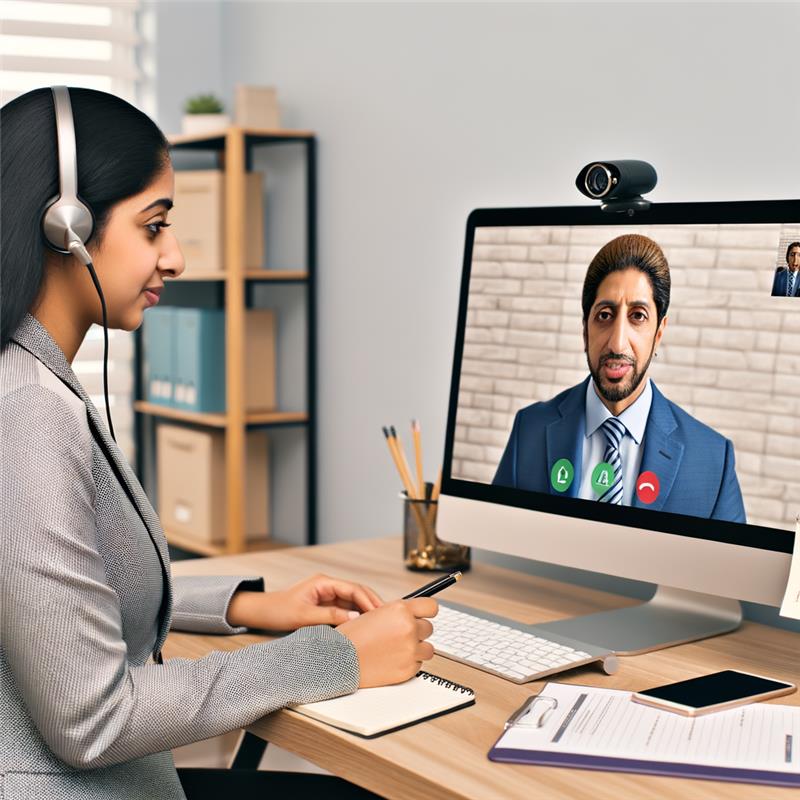Virtual interviews have revolutionized the hiring process, offering convenience, efficiency, and the ability to connect with top talent globally. As businesses increasingly adopt remote work models, mastering virtual interviewing is essential for every recruiter and hiring manager. This guide explores everything you need to know to conduct effective virtual interviews.
What Are Virtual Interviews?
Virtual interviews are interviews conducted through online platforms such as Zoom, Microsoft Teams, or Google Meet. They enable recruiters to evaluate candidates remotely, bridging geographical distances and making the hiring process more efficient.
Key Features of Virtual Interviews:
- Real-time video and audio interaction.
- Use of AI tools for candidate assessments.
- Compatibility with hybrid and remote work environments.
Why Virtual Interviews Are Essential in Modern Hiring
- Access to a Global Talent Pool
Virtual interviews remove geographical limitations, enabling organizations to connect with skilled professionals worldwide.
- Cost and Time Efficiency
Save time and resources by reducing the need for physical travel, making the hiring process faster and more economical.
- Convenience for Both Parties
Candidates can participate from the comfort of their chosen environment, ensuring a stress-free experience.
- Alignment with Remote Work Trends
As remote and hybrid work models become the norm, virtual interviews are critical for assessing candidates’ readiness for these roles.
Preparation Tips for Conducting Virtual Interviews
Choose the Right Tools
Select a reliable video conferencing platform like Zoom or Google Meet. Explore features such as:
- Screen sharing for tests or presentations.
- Breakout rooms for panel interviews.
- Real-time chat for sharing resources or questions.
Create a Comprehensive Interview Plan
Outline the purpose of the interview, key topics to discuss, and specific questions to assess candidates effectively.
Test Technology in Advance
Ensure that your internet connection, camera, microphone, and other tools function correctly. Perform a trial run to address potential technical issues.
Communicate Expectations Clearly
Share details about:
- The platform to be used.
- Meeting links or credentials.
- Required documents or tests to prepare.
Set Up a Professional Environment
Choose a quiet, well-lit space free of distractions. Your background should reflect a professional setting.
Tips for Conducting an Effective Virtual Interview
Build Rapport with the Candidate
Start with light conversation to make the candidate comfortable. Building a connection ensures a smoother interview process.
Evaluate Key Skills Effectively
Virtual interviews allow you to assess important skills like:
- Communication: Clarity, confidence, and articulation in responses.
- Time Management: Understanding how the candidate prioritizes tasks in a remote setting.
- Adaptability: Ability to handle remote work challenges.
Leverage Technology
Use tools like AI-powered platforms to analyze candidate responses and evaluate communication and problem-solving skills.
Record Interviews for Reference (With Consent)
Recording interviews enables stakeholders to revisit discussions and make informed hiring decisions.
Overcoming Challenges in Virtual Interviews
- Technical Glitches
Solution: Test all equipment and have backup tools ready. Provide candidates with troubleshooting tips.
- Lack of Non-Verbal Cues
Solution: Pay close attention to voice tone, eye contact, and facial expressions for better understanding.
- Managing Candidate Discomfort
Solution: Share the interview structure beforehand and ensure candidates have adequate time to prepare.
Post-Interview Best Practices
- Provide Constructive Feedback
Promptly share feedback to maintain a positive experience for the candidate, even if they are not selected.
- Collaborate with Stakeholders
Share notes, recordings, and assessments with hiring teams to finalize decisions.
- Communicate Next Steps Clearly
Let candidates know the timeline for updates or the next round. Transparency fosters trust.
Pro Tips for Virtual Interviewing Success
Optimize for Remote Roles: Tailor questions to assess self-motivation, collaboration, and productivity in remote settings.
Incorporate AI Tools: Use AI tools for deeper insights into candidate responses.
Stay Updated: Keep up with trends and tools in virtual interviewing to enhance the experience.






